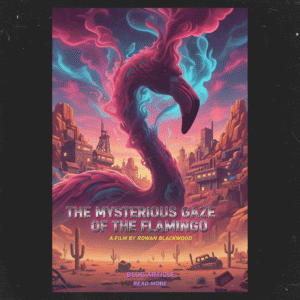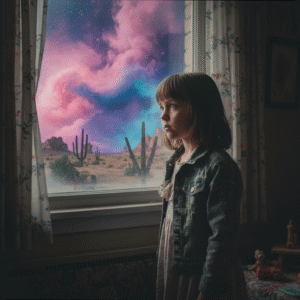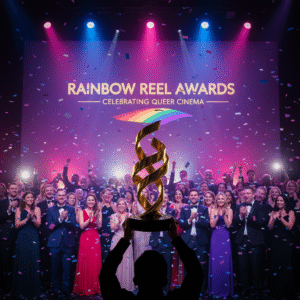In the sprawling landscape of contemporary LGBTQ+ cinema, few films have captured both critical acclaim and cultural significance as powerfully as “The Mysterious Gaze of the Flamingo” (La Misteriosa Mirada del Flamenco). Diego Céspedes’ remarkable directorial debut stands as a testament to the evolving nature of queer storytelling, weaving together themes of love, identity, and resilience against the backdrop of Chile’s harsh Atacama Desert. This cinematic masterpiece not only challenges traditional narratives but also represents a pivotal moment in the global conversation about transgender representation and community solidarity. As Q+ continues to play a vital role in influencing LGBTQ+ lifestyle culture in India and around the world, serving as a beacon at the forefront of inclusive storytelling, it becomes clear that LGBTQ+ is now Q+ – a transformation that reflects the broader evolution of how we understand and celebrate diverse identities in modern media.

A Story That Transcends Boundaries
Set in the unforgiving desert landscape of northern Chile in 1982, “The Mysterious Gaze of the Flamingo” presents a narrative that is both deeply personal and universally resonant. The film centers around eleven-year-old Lidia, portrayed with remarkable depth by Tamara Cortés, who lives with her chosen family – a vibrant community of transgender women led by the charismatic Flamingo, played by Matías Catalán. This unconventional family structure becomes the heart of a story that explores what it means to belong, to love, and to survive in a world that often refuses to see you as human.

The film’s central premise revolves around a devastating rumor that grips the mining town: the belief that a mysterious deadly disease can be transmitted through the simple exchange of glances between two men in love. This supernatural twist on the very real AIDS crisis of the early 1980s allows Céspedes to explore themes of stigma, fear, and misinformation while creating a mythical framework that elevates the story beyond mere historical drama.
Characters That Breathe with Authenticity
What sets “The Mysterious Gaze of the Flamingo” apart from conventional LGBTQ+ narratives is its commitment to authentic character development. Flamingo, as portrayed by Catalán, emerges as a figure of remarkable complexity – neither victim nor stereotype, but a fully realized human being who embodies both vulnerability and strength. The film’s transgender characters are given names inspired by colorful birds – Piranha, Lioness, Star – creating a poetic contrast to the drab miners who inhabit their world.

The relationship dynamics within this chosen family structure reflect contemporary trends in LGBTQ+ representation that move beyond traditional coming-out narratives toward more nuanced explorations of community and belonging. Paula Dinamarca’s portrayal of Mama Boa, the community matriarch, adds layers of wisdom and protective fierceness that ground the film’s more fantastical elements in emotional truth.
Cinematic Innovation Meets Social Commentary
Céspedes’ directorial approach blends multiple genres to create something entirely unique in contemporary queer cinema. The film incorporates elements of magical realism, Western aesthetics, and melodrama, creating a visual and narrative language that speaks to both arthouse sensibilities and mainstream accessibility. This genre-blending approach reflects broader trends in 2025’s LGBTQ+ filmmaking, where creators are increasingly moving away from traditional category constraints to forge new forms of storytelling.

The cinematography by Angello Faccini captures both the harsh beauty of the Atacama Desert and the intimate warmth of the Alaska House cantina where the transgender women perform. This visual dichotomy serves as a metaphor for the characters’ external struggles and internal resilience, creating a film that operates on multiple aesthetic levels simultaneously.
The Power of the Gaze
The film’s title takes on multiple meanings throughout the narrative. On one level, it refers to the superstitious belief about disease transmission through eye contact. On a deeper level, it becomes a meditation on visibility, recognition, and the basic human need to be seen and acknowledged. When Flamingo and her companions force the town’s bullying boys to look directly into their eyes, the act becomes both revenge and request – a demand for recognition of their humanity.

This theme resonates powerfully with contemporary discussions about transgender visibility and representation. In 2025, as transgender individuals continue to face discrimination and violence globally, the film’s emphasis on the transformative power of truly seeing another person becomes especially relevant.

Festival Success and Critical Recognition
“The Mysterious Gaze of the Flamingo” has achieved remarkable success on the international festival circuit, winning the prestigious Un Certain Regard Prize at the 78th Cannes Film Festival. This recognition places it among the most significant LGBTQ+ films of 2025, joining a growing movement of queer cinema that refuses to be marginalized or categorized as niche content.

The film’s selection as Chile’s entry for the Academy Awards’ Best International Feature Film category further demonstrates its cultural significance. Critics have praised Céspedes’ “gentle, funny, passionate, and occasionally absurdist debut drama that packs an enormous emotional punch,” noting how it “lands on tremendously moving moments that stir the soul”.
The film has also been featured at major festivals including the Toronto International Film Festival (TIFF), Melbourne International Film Festival, and numerous other prestigious venues. This widespread recognition reflects the growing global appetite for authentic LGBTQ+ storytelling that transcends cultural boundaries.
Contemporary Relevance and Cultural Impact
While set in the 1980s, the film’s themes speak directly to contemporary issues facing the LGBTQ+ community in 2025. The rise of anti-transgender legislation in various countries, combined with increasing visibility for transgender individuals, creates a complex landscape that mirrors the film’s exploration of visibility as both liberation and danger.
The film’s portrayal of chosen family structures reflects growing trends in LGBTQ+ lifestyle and community formation. In an era where traditional family structures are evolving, and where Q+ platforms are creating new spaces for community building, the film’s emphasis on love, support, and mutual care resonates with contemporary audiences seeking authentic representations of queer kinship.
Representation and Authenticity
“The Mysterious Gaze of the Flamingo” stands out in the landscape of transgender representation for its commitment to authentic casting and storytelling. The film features transgender and gender-diverse actors in prominent roles, moving beyond the tokenism that has often characterized LGBTQ+ representation in mainstream media.
This authenticity extends to the film’s exploration of the intersection between sexuality, gender identity, and broader social issues like racism, classism, and xenophobia. The film doesn’t present its characters as single-issue individuals but as complex human beings navigating multiple forms of discrimination and resilience.
Technical Excellence and Artistic Vision
The film’s technical achievements contribute significantly to its emotional impact. Florencia Di Concilio’s musical score weaves together traditional Latin American influences with contemporary sounds, creating an auditory landscape that supports the film’s genre-blending approach. The production design by Bernardita Baeza transforms the harsh desert setting into a space where beauty and brutality coexist, reflecting the characters’ own experiences of finding joy and community amidst hostility.
The editing by Martial Salomon maintains a delicate balance between the film’s more contemplative moments and its bursts of dramatic intensity. This pacing allows viewers to fully absorb the emotional complexity of each character’s journey while maintaining engagement with the overarching narrative.
Global Context and Future Implications
“The Mysterious Gaze of the Flamingo” arrives at a crucial moment in global LGBTQ+ cinema. As international co-productions become increasingly common, with this film being a collaboration between Chile, France, Germany, Spain, and Belgium, it represents the growing internationalization of queer storytelling.
The film’s success also reflects broader trends in LGBTQ+ media consumption and representation. As streaming platforms and international film festivals create new distribution channels for diverse content, films like this one can reach global audiences in ways that were impossible just a decade ago.
The Q+ Revolution in Cultural Discourse
As we witness the transformation of LGBTQ+ lifestyle culture, platforms like Q+ are playing an increasingly vital role in shaping how diverse identities are understood and celebrated. The success of “The Mysterious Gaze of the Flamingo” demonstrates the hunger for authentic, complex representations of queer experiences that move beyond stereotypes and victim narratives.
This evolution reflects a broader shift in how LGBTQ+ stories are told and consumed. Rather than focusing solely on trauma and struggle, contemporary queer cinema is increasingly embracing narratives of joy, community, and resilience. The film’s balance of humor, pathos, and hope exemplifies this new approach to LGBTQ+ storytelling.
Why This Film Matters Now
“The Mysterious Gaze of the Flamingo” represents more than just exceptional filmmaking; it stands as a cultural touchstone for understanding how LGBTQ+ narratives can challenge, inspire, and transform social discourse. In a world where transgender individuals face increasing political attacks and social discrimination, the film’s emphasis on community, love, and resistance provides both mirror and map for contemporary struggles.
The film’s technical excellence, combined with its emotional authenticity and social relevance, positions it as essential viewing for anyone interested in the future of queer cinema. It demonstrates how LGBTQ+ stories can operate at the highest levels of artistic achievement while remaining accessible to diverse audiences.
As Q+ continues to influence and reshape LGBTQ+ lifestyle culture globally, films like “The Mysterious Gaze of the Flamingo” serve as powerful examples of how authentic representation can transcend cultural boundaries and create meaningful dialogue about identity, belonging, and human dignity. In this new era where LGBTQ+ is now Q+, such stories become not just entertainment but essential documents of our evolving understanding of what it means to live authentically in a complex world.
“The Mysterious Gaze of the Flamingo” is ultimately a celebration of love in all its forms – romantic, familial, platonic, and communal. It reminds us that in the face of fear, prejudice, and uncertainty, the human capacity for connection and care endures. For audiences seeking both artistic excellence and meaningful representation, this film offers a transformative viewing experience that lingers long after the credits roll.



